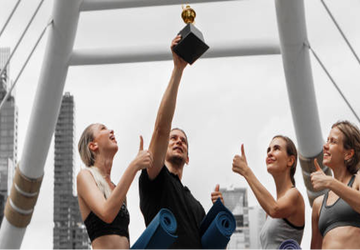health
Deciphering Ideal Exercise Timing
Unraveling the puzzle of the best time for a workout is more than just a matter of preference. It involves understanding your body's rhythms and how they align with your fitness goals. Let’s delve into why exercise timing matters and how it can make a difference in your routine.
Morning Sessions: Dawn's Early Light
For many, seizing the day begins with morning exercise. It's a time when the world is just waking up, offering a peaceful ambiance for a workout.
Why Morning May Be the Best Time for a Workout:

● Elevated energy levels: Kickstarting your day with physical activity can lead to sustained energy levels.
● Hormonal balance: Morning workouts align with your body’s natural hormone fluctuations, potentially enhancing your fitness outcomes.
● Mood enhancement: Engaging in exercise early can lift your spirits, setting a positive tone for the day.
● Enhanced discipline: Early risers often develop stronger self-discipline, crucial for fitness success.
● Quiet environment: Fewer distractions in the early morning can lead to more focused and effective workouts.
● Sunrise inspiration: Exercising as the sun rises can be a profound and motivating experience.
Late Morning: The Late Starter's Strength
Not everyone is an early bird, and late mornings offer a balanced alternative for a workout.
Advantages of Late Morning Exercise:
● Warmed-up body: By late morning, your body is more awake and warmed up, potentially reducing the risk of injuries.
● Balanced energy: This time allows for a pre-workout meal, providing the energy needed for an intense session.
● Mental readiness: Having tackled the initial tasks of the day, your mind may be more prepared for a workout.
Midday Movements: The Lunchtime Lift
The afternoon, often overlooked, can be the best time for a workout for those who need a midday boost.
The Upsides of Afternoon Exercise:
● Temperature peak: Your body naturally warms up throughout the day, potentially reducing the risk of injury during exercise.
● Mental clarity: A break from work or daily chores with some physical activity can clear your mind and improve focus.
● Performance potential: Some studies suggest physical performance may peak in the early afternoon, making it a prime time for more intense workouts.
● Overcoming the slump: Physical activity can rejuvenate your energy levels during the afternoon dip.
● Flexible scheduling: For those with variable schedules, the afternoon offers a practical window for exercise.
● Social dynamics: Afternoon gym sessions can be more social, offering opportunities for group workouts.
Evening Exertion: The Twilight Zone
The night can be an enchanting time to engage in physical activity, especially for those who find mornings daunting.
Benefits of Evening Workouts:
● Wind down: Exercising in the evening can be a great way to unwind after a busy day.
● Social synergy: Evening classes or group activities offer a chance to connect with others, boosting your motivation.
● Nighttime calm: There’s a unique tranquility in evening workouts, whether it's a jog under the stars or a quiet session at the gym.
● Tranquil ambiance: Gyms are less crowded, and streets are quieter, providing a peaceful workout environment.
● Reflective workouts: The night allows for a more introspective and meditative exercise experience.
● Flexibility: For those with unconventional schedules, nighttime might be the only feasible option.
Innovating Your Exercise Schedule: Finding the Prime Exercise Timing

When seeking the best time for a workout, it's not just about the hour on the clock, but also about integrating exercise seamlessly into your life. Let’s explore fresh perspectives on when to exercise that consider both personal well-being and practical lifestyle factors.
Understanding Your Personal Energy Cycle
Everyone has a unique energy ebb and flow throughout the day. Identifying your personal high-energy periods can be key in determining the best time for a workout.
Personal Energy Insights:
● Self-assessment: Pay attention to when you feel most energetic during the day. This self-awareness can guide your decision about when to exercise.
● Experimentation: Try exercising at different times and note how you feel during and after the workout.
The Impact of Work-Life Balance on Workout Timing
Your professional and personal commitments play a significant role in deciding when to exercise. Balancing these elements is crucial for a sustainable workout routine.
Work-Life Integration:
● Remote workers: Those working from home might find midday breaks ideal for a quick workout session.
● Shift workers: If you work non-traditional hours, identifying quiet times in your schedule for exercise can help maintain consistency.
Leveraging Technology to Determine Workout Times
Modern technology, like fitness trackers and mobile apps, can provide insights into the best time for a workout based on your physical and sleep patterns.
Technological Aids:
● Fitness trackers: Use data from wearable devices to understand your physical activity patterns and energy levels throughout the day.
● Sleep tracking: Monitor your sleep quality to decide the optimal time for exercise, ensuring it doesn’t interfere with restful sleep.
The Influence of Social Factors on Exercise Timing
Your social environment and commitments can influence your decision about when to exercise. Aligning workout times with social interactions can enhance motivation.
Social Timing Considerations:
● Group exercises: If you enjoy social workouts, evening classes or weekend group activities might be ideal.
● Family activities: Incorporating physical activities into family time, like weekend hikes or morning walks, can be a great way to exercise.
Adapting to Seasonal and Environmental Changes
The seasons and your environment should also be considered when determining exercise timing. Adapting to these changes can keep your routine effective and enjoyable.
Seasonal Adaptations:
● Weather patterns: In hot climates, early morning or late evening workouts might be more comfortable.
● Daylight hours: Utilize longer daylight in summer for early morning or late evening outdoor activities.
Conclusion
When to exercise is a personal choice influenced by lifestyle, body rhythms, and preferences. While the best time for a workout can vary from person to person, what remains constant is the importance of regular physical activity. So, whether it's at dawn, noon, or dusk, remember, exercise timing matters. The key is to find a time that resonates with your schedule and body, ensuring a consistent and enjoyable exercise routine.

